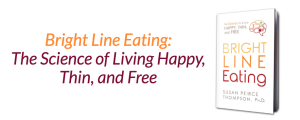 1. What does, “The brain is blocking weight loss” mean?
1. What does, “The brain is blocking weight loss” mean?
Eating off the Standard American Diet causes changes in the brain that block weight loss. Specifically, maintaining an elevated insulin level blocks the brain from recognizing the critical hormone leptin. And it’s leptin that signals to the brain that we’re full. For years scientists thought overweight people might be missing it. But no, overweight people actually have more leptin in their bodies than slender people. It’s just that the elevated insulin in their bloodstream prevents the brain from recognizing its own leptin.
That means that excess insulin isn’t just putting them at risk for Type II Diabetes, it’s also keeping them feeling relentlessly hungry and tired. Until they get their baseline insulin levels down no diet will be stronger than their brain’s impulse to eat.
The second mechanism in the brain that blocks weight loss is overpowering cravings. These are caused by repeatedly eating more sugar than the brain can process. I’m talking about the frozen whipped coffee drink that’s a thousand calories, the doughnut breakfast and frozen yoghurt dinner. When the brain’s nucleus accumbens — its seat of pleasure, reward and motivation — is hit with that kind of excessive stimulation it protects itself by ‘down-regulating.’ How? It turns off some pleasure receptors so it won’t be bombarded as hard the next time. So then when you order the Coffee-Whippy-Coolio again it won’t give you the same satisfaction as the time before. But you will still just have hit your brain with the same amount of sugar. So it will respond by turning off even more receptors.
It only takes three weeks of daily average U.S. sugar consumption, 19.5 teaspoons, for this cycle to start. Where it leads is that scans show the brain of an obese person is more downregulated than a cocaine addict’s. And, just like an addict uses substances simply to feel normal, not high, people caught in this vicious cycle can’t really taste their food, or feel satiated, anymore.
But both these processes can be reversed by eating the right foods. I did it myself and have helped thousands of others do the same.
2. How is it possible to make a diet work?
First, choosing a diet that takes into account the brain’s potential to block weight loss and emphasizes regular, healthy meals. Quick fixes like a regiment of juice fasts, shakes, protein bars or pre-made diet meals just won’t cut it because they’re not sustainable over time, and frequently they’re sweetened, perpetuating the underlying cognitive cycle.
It’s also key to understand how willpower works and to plan accordingly. Willpower isn’t a dimension of personality, or character. It’s simply a cognitive function available to us in limited doses: as little as 15 minutes of willpower at our disposal at any given time before it runs dry. And we draw down on that supply to focus at work or keep our patience with our kids.
It’s no surprise then that when there are temptations everywhere, we fall victim to the “Willpower Gap” and cave! But there are ways to expand willpower: planning ahead, eating regular meals, reducing stress, getting enough sleep, and practicing an attitude of gratitude.
3. How does eating regular meals fill the willpower Gap and support weight loss?
When regular meals become part of the scaffolding of your life, it takes the burden off of willpower. A schedule of eating three meals a day at regular mealtimes—breakfast, lunch, and dinner —not only helps eating the right things become automatic, but also passing up the wrong things in between. I don’t have to try to not brush my teeth in the car, I just wouldn’t do it. Similarly, I don’t eat or drink high-calorie foods while driving. It’s off the table. I don’t eat at the couch, I don’t eat on the bleachers, I don’t eat at the movie theatre. I eat at my kitchen table or at a restaurant. Those are my cues. That is literally hundreds of food choices a day I have eliminated with that simple rule.
4. How can the brain be rewired if it is set up for food addiction?
Flour and sugar are the culprits causing changes in the brain that block weight loss. Consuming them rewires the brain to ensure that we will continue eating more and more of both. In other words, they are highly addictive and as harmful to the brain as cocaine and other powdered drugs
As with any addiction, the only sustainable solution is to detox. Completely. Eliminate both from the diet altogether.
It’s also important to have regular meals, as mentioned above, and to eat the right quantities. Most adults no longer receive reliable signals from their brains to stop eating when they’ve had enough. Eating right-sized portions will revive those signals over time and help the pounds melt off. But it’s important to note that “right-sized” does not mean small. It’s important to fill the stomach at every meal so that the body does not start to slow the metabolism.
Finally, consistency is of the essence. Like a drug rehab program, make these “Bright Lines” non-negotiable. Doing so will take the burden off willpower, make good choices automatic, and remove the ambiguity that leads people to fall back into old habits.
5. On special occasions, should people ‘save it all up’ for that one big meal of the day (such as Thanksgiving dinner, or a wedding feast), or does having a big breakfast that morning actually make you eat less?
My experience from helping over 4,000 people lose upward of 133,000 pounds and from my own weight loss journey, has shown that eating regular meals is one the best tools for avoiding overeating. “Saving it all up” for a single meal means skimping on meals beforehand and then overeating, which is pretty much the polar opposite of a regular meal schedule. That’s why I advise having a normal breakfast AND — if your special meal is scheduled for a time between the usual lunch and dinner hours — to have your usual lunch as well. Doing so prevents you from showing up for that special meal starving and primed to consume far too much. Remember, you can savor the flavor without overdoing on the quantities.
6. What makes this so difficult for people to break a habit, even when they know their habit (like smoking, eating fast food etc.) is killing them?
Habits that trigger dopamine release in the brain–smoking, eating sugar, watching porn–are addictive. If they’ve been engaged in to the point where they are hard to stop it means that at some point that habit triggered a dopamine flood that was stronger than the brain could handle. Over a few weeks it responded by taking some of its pleasure receptors offline to cope with the onslaught. Once that happens the brain requires more stimulation to get the same dopamine response. And soon one is stuck in a cycle of drinking caffeine–or smoking cigarettes–or eating sugar–just to feel normal. Just to get back to that baseline. It’s a vicious cycle. One that can only be broken by stopping that habit cold, and giving the brain a minimum of six months for those receptors to replenish in the brain.
7. How long really does it take to form a habit (I have read as few as 15 days and up to 250 days!)?
66 days on average. Meaning it might take three months, have patience. It’s so worth it.
by Dr. Susan Peirce Thompson
—————-
Thank you to Dr. Susan Pierce Thompson for these awesome questions and answers!! If you’d like to sample the power of Bright Lines Eating- which I highly recommend if you’re sick of bingeing and yo yo dieting- check out the 14 Day Bright Line Eating Challenge and you’ll not only receive 2 whole weeks of the BLE program, but also a copy of the Bright Lines Eating book that is just being released for the first time, NOW!
I’ve lost over 35 lbs using the Bright Lines Eating system– the first 30 lbs took about 6 months and I’ve lost about 5 lbs in the second 6 month period. I’ve been eating happily, deliciously and binge-free for almost a year. I LOVE this way of eating and plan on eating this way for the rest of my life! I don’t think I’ve ever said that about any eating plan out there! (And I haven’t been perfect the whole time! But when I veered of the path of happiness, I quickly bounced back and came back to the sanity and peace of my Bright Lines feeling so much better, happier and free!!!)









